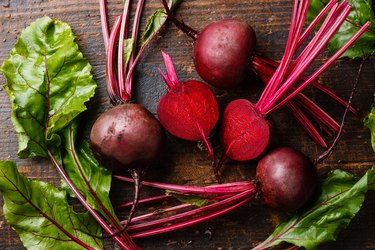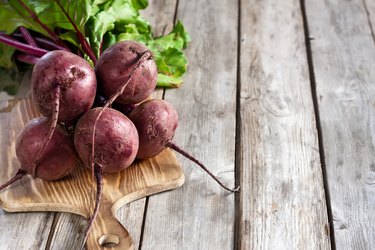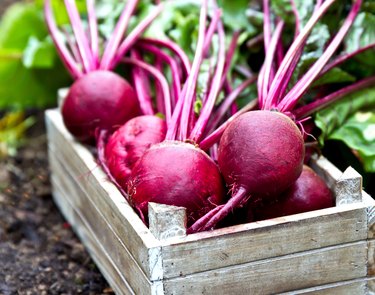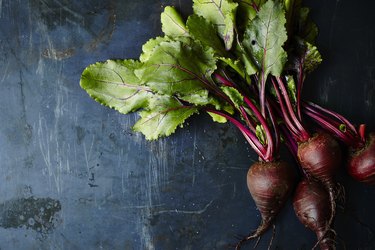
Beets are best known for their bright red hue. They have an earthy taste that is often described as slightly sweet and even floral. Some critics say that beets taste like dirt, but when prepared the right way, they're a delicious source of many nutrients.
Beets have many health benefits, but cooking them can be time-consuming. One workaround is adding raw beets into your meal plan. Here's why you should give the root vegetables a chance, and dietitians' tips to incorporate them raw into your diet.
Video of the Day
Video of the Day
Can You Eat Beets Raw?
Boiling and roasting are some of the most common ways to cook beets, but they can be steamed, pickled or microwaved, too. The easiest and fastest way to eat beets? Raw. This method requires the least amount of preparation.
Eating raw beets isn't just possible, it may be the more nutritious choice. "Raw beets provide the most nutritional benefit, as they lose antioxidant concentration once they are cooked," says registered dietitian Whitney Stuart, RDN, CDE.
All parts of fresh beets can be eaten raw, according to the University of Illinois. This includes the leaves and stems, which are usually discarded. The main part of the beet that's eaten raw is the bulb. The skin is edible, so you can choose to eat or peel it.
The Health Benefits of Raw Beets
Beets have many benefits. They're full of antioxidants, anti-inflammatory properties, fiber, nitrates, vitamins and minerals, according to the Cleveland Clinic. Here's what they have to offer.
1. Raw Beet Juice May Help Improve Blood Pressure
Beets are known for their high concentration of organic compounds called nitrates. There is some evidence that dietary nitrates have heart health benefits, according to a November 2017 review in Nutrients.
"Raw beets may improve blood pressure, thanks to their nitrates," explains registered dietitian Justine Chan, MHSc, RD, CDE. "Nitrates convert into nitric oxide in your body, which opens up your blood vessels and lowers blood pressure."
Beetroot juice has the potential to lower blood pressure in people with and without hypertension (high blood pressure), according to a November 2018 review in Biomolecules. This can also decrease the risk of cardiovascular events and the mortality rates associated with them.
2. Beet Juice May Help Increase Athletic Endurance
Beetroot juice and even beet powder have become increasingly popular among athletes because they can help with athletic endurance and performance.
"Beets can help to increase the blood flow and oxygen that's delivered to muscles during exercise," Chan says. "It's no surprise that beetroot juice may improve your athletic performance as a result."
Exercise can be exhausting, but beets can help — they have the ability to improve endurance and training performance, according to December 2019 research in Cureus. The nitrates in beetroot juice are especially helpful for reducing fatigue and increasing muscle power, according to a January 2018 review in the Journal of the International Society of Sports Nutrition.
3. Beet Juice Can Help With Muscle Soreness and Recovery
What you eat and drink after your workout is also important. Post-exercise nutrition can help with muscle recovery.
There's evidence that beetroot juice may reduce muscle soreness and promote quicker recovery after exercise, according to a June 2021 meta-analysis in the Journal of Dietary Supplements.
4. Raw Beets Are Linked to Lower Rates of Cancer
The bright pigment — betalain — responsible for beet's red hue may also lend it some of its health benefits. Specifically, betalains possess antioxidant activity.
"Betalains in beets act as powerful antioxidants and exert antitumor activity," Stuart says. "Beet juice shows chemo-preventive activity, preventing the growth of cancerous cells and reducing overall inflammation."
These pigments are effective at cancer chemoprevention, according to April 2019 research in Molecules. Red beets have also been shown to possess significant antioxidant capacity.
Warning
While there are many benefits of raw beets, people who are prone to kidney stones should eat them in moderation. That's because beets are high in oxalates, which can contribute to kidney stones, according to the Cleveland Clinic.
- University of Illinois: "Eating Beets from Root to Stalk"
- Cleveland Clinic: "The Health Benefits of Beets"
- Biomolecules: "Dietary Nitrate from Beetroot Juice for Hypertension: A Systematic Review"
- Nutrients: "Performance and Health Benefits of Dietary Nitrate Supplementation in Older Adults: A Systematic Review"
- Cureus: "Physiological Effects of Beetroot in Athletes and Patients"
- Journal of the International Society of Sports Nutrition: "Effects of beetroot juice supplementation on intermittent high-intensity exercise efforts"
- Journal of Dietary Supplements: "The Effect of Nitrate-Rich Beetroot Juice on Markers of Exercise-Induced Muscle Damage: A Systematic Review and Meta-Analysis of Human Intervention Trials"
- Molecules: "Red Beetroot and Betalains as Cancer Chemopreventative Agents"


